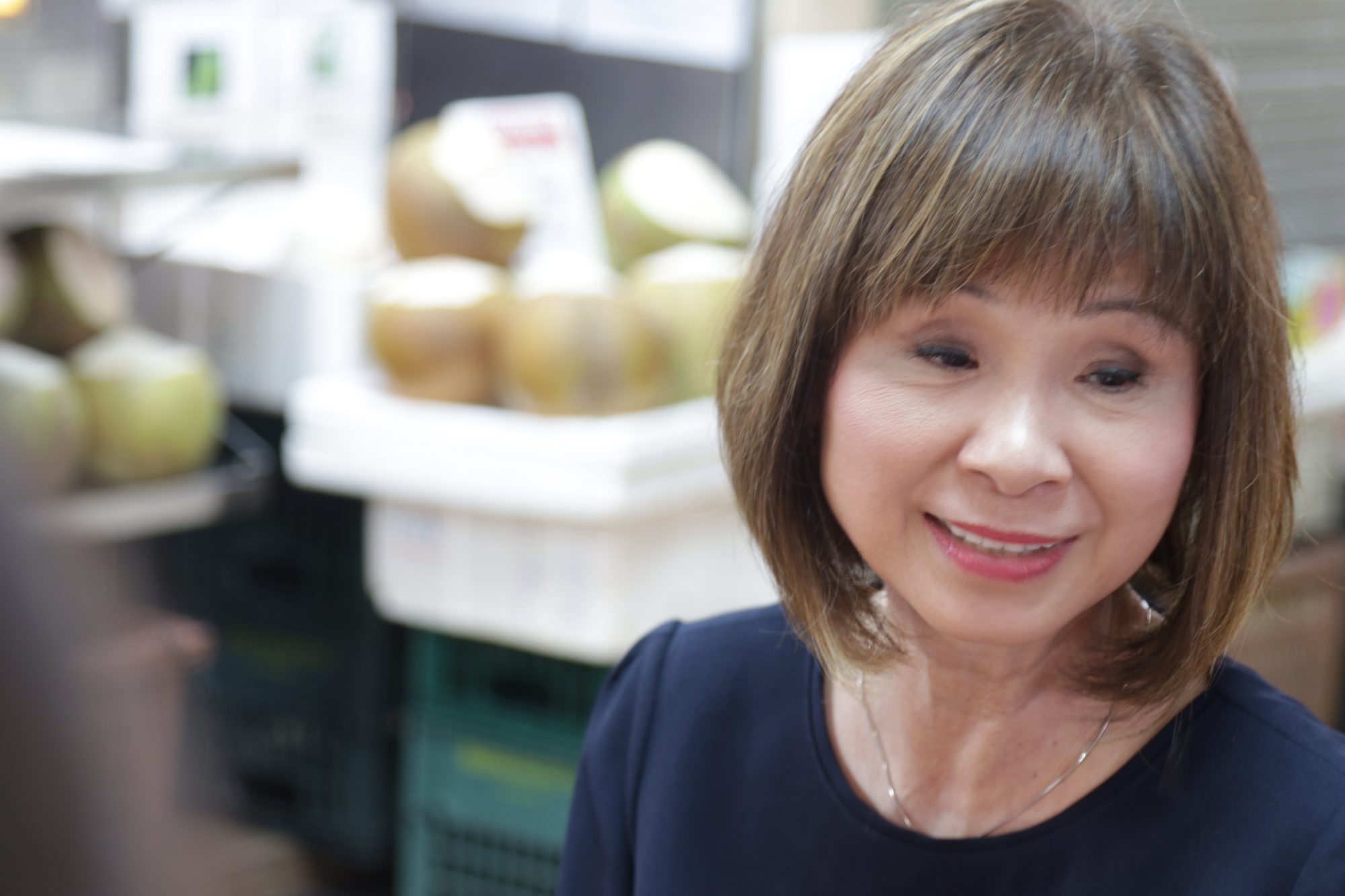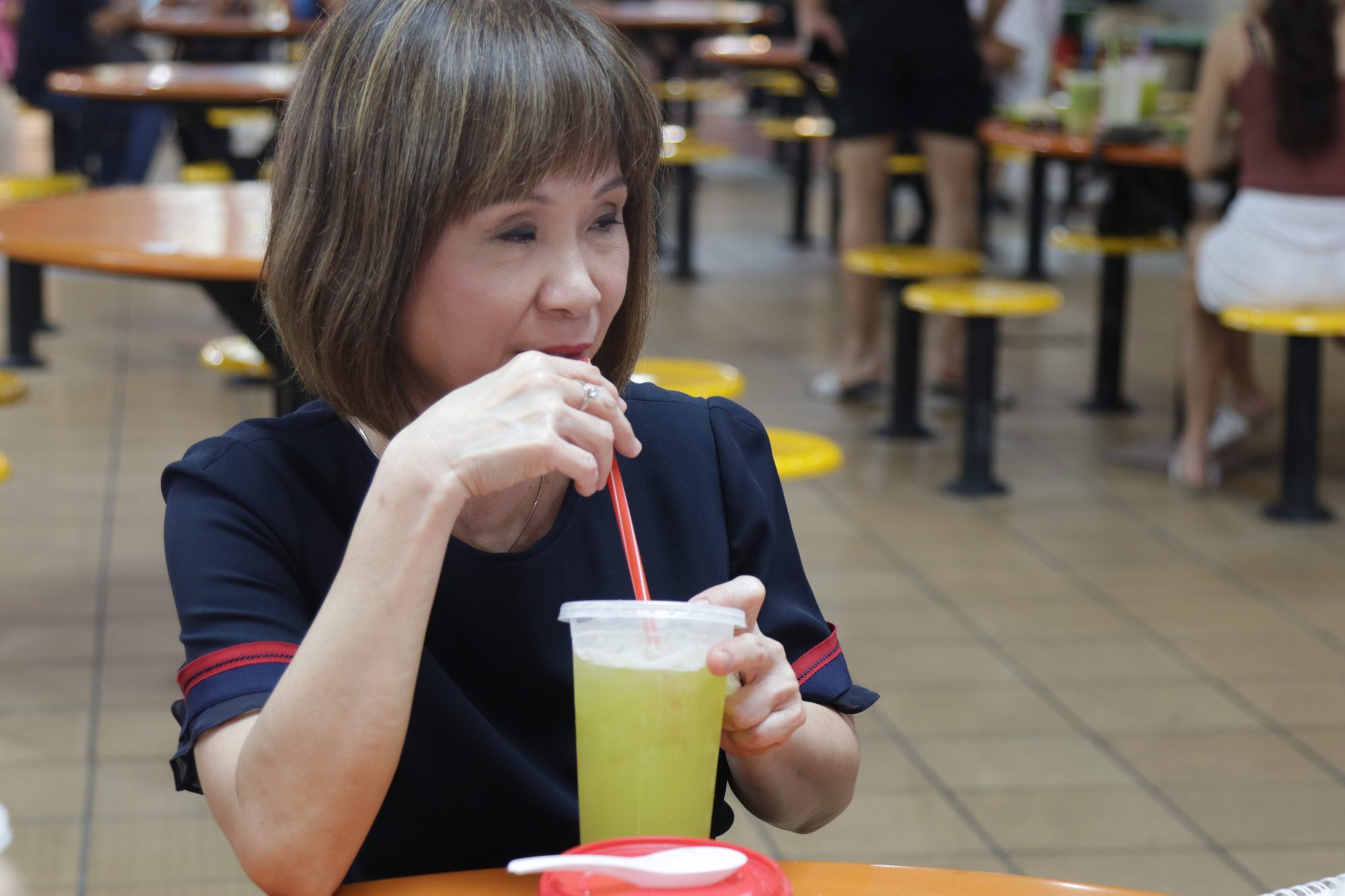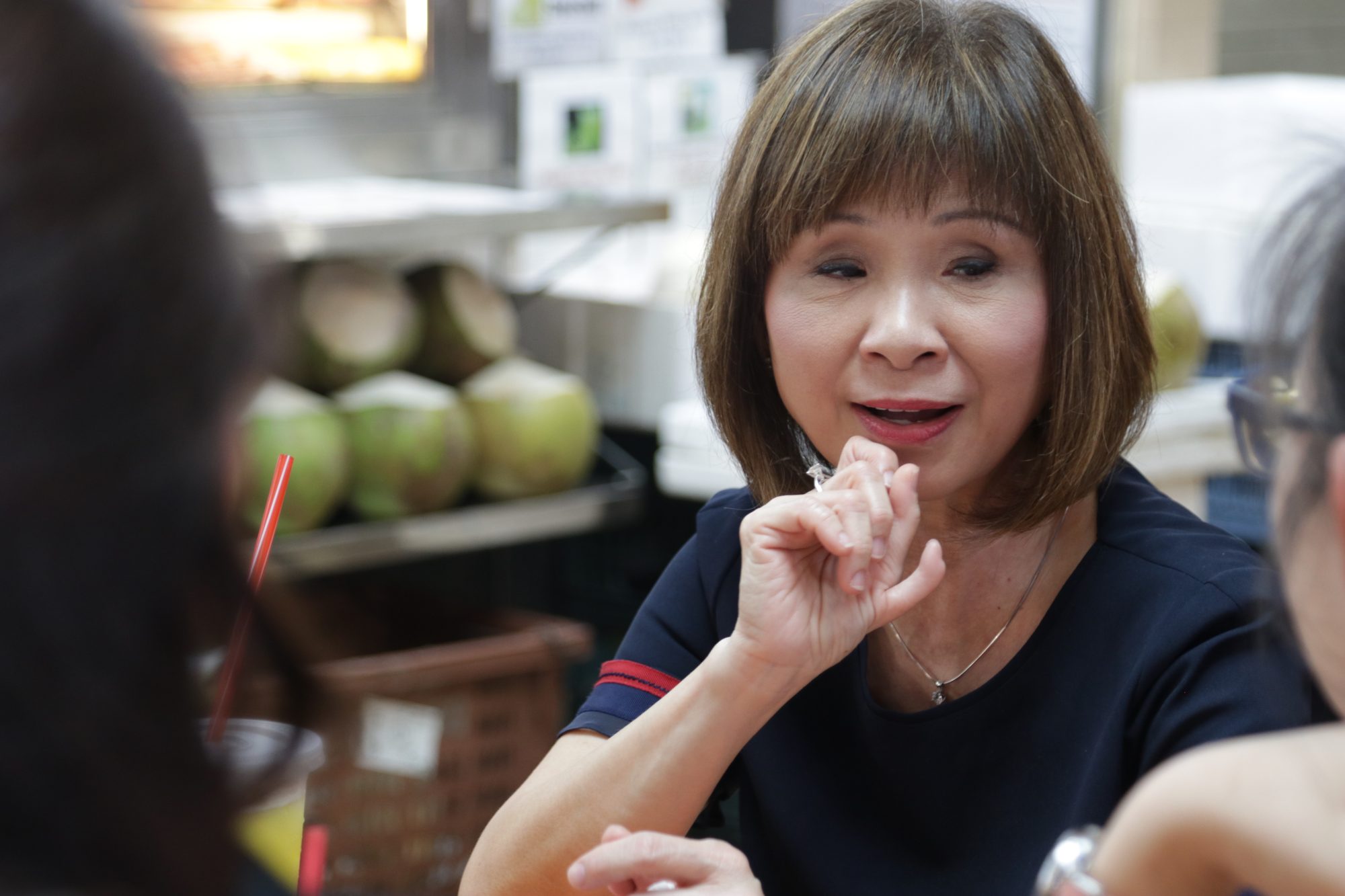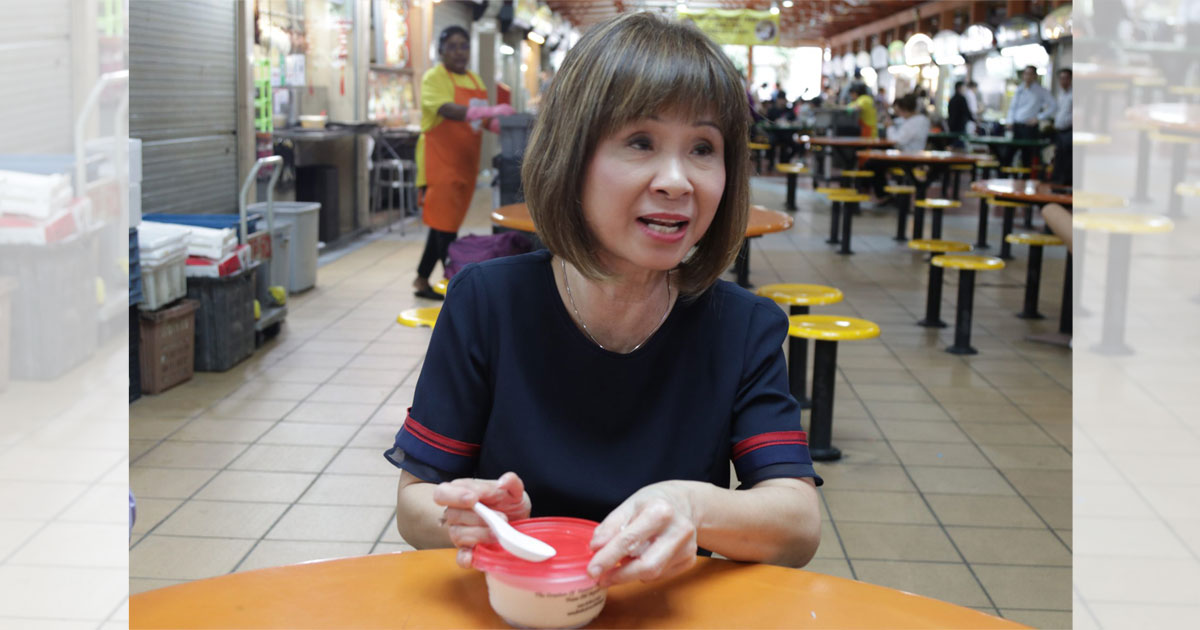Amy Khor is pretty darn passionate about hawker food.
Upon her arrival at Maxwell Food Centre, she is waylaid by hawkers left and right and takes a good 10 minutes to traverse the two-third length of the hawker centre to our table.
In the seventh minute of our conversation, she's educating us about wa kueh, which she used to get free portions of from a now-extinct stall at ABC Brickworks Market & Food Centre because she tutored the wa kueh stall owner's two children in her pre-university years at Raffles Institution.
And in case any of you are wondering, because we were, this is what wa kueh looks like — seems one of the last places to get it is at Chinatown Complex Food Centre:
But surely, everyone can talk about hawker food easily — toss a pebble and you'd likely hit a Singaporean who discerns between the best stalls for carrot cake (different ones for black and white, mind you), scissors-cut curry png (rice), and nasi padang.
Chances are also reasonably high that you'd quite easily find someone who makes weekly trips to far-flung places for "food therapy" (something Khor used to do before she got too busy with ministry work and constituency activities), or — this one perhaps less likely, even happens to have friends who are longtime hawkers.
The hawker centre salesperson
 Photo by Olivia Lin
Photo by Olivia Lin
The 60-year-old (yes, she's 60!) checks all these boxes, and also slips into eager-aunty mode pointing to the stalls she buys her kway teow, fish porridge and rojak from, and enthuses the quality and variety of the freshly-made min jiang kueh (peanut cake) made at a stall at Yishun Park Hawker Centre.
But perhaps the biggest sign of her great hawker foodie fandom would be how it has "infected" her family.
Her 28-year-old son, who attends food photography classes with Leslie Tay of the ieatishootipost fame, goes on weekly hawker food hunts. Most importantly, on Saturdays, he brings his grandma (her mother, who used to run a Chinese dessert stall at Khor's primary school) to ABC Brickworks for food and to make her rounds catching up with her friends.
ABC Brickworks is a place of significant meaning for Khor and her family, having grown up in a flat in Rumah Tinggi (just behind it). She speaks fondly of the hawkers there, and also goes back to visit (and eat, too, of course) whenever she can.
In her primary and secondary school years, Khor would wake up at 3am to help her mother prepare a range of dessert food items to sell at Alexandra Hill (Integrated) Primary School. As her school session was in the afternoon, a young and enterprising Khor ran delivery rounds with the teachers at the school so she could double the price of the food items she sold (20 cents, as opposed to just 10 cents for students) to them.
This also meant studying was done at the stall and on the hour-long 191 bus rides she took to and from Stevens Road, she explains, but she really loved learning (despite claiming she isn't actually great at it), and so took her interest in learning anything in general all the way to a PhD in land management, which she got after her Master's degree in the U.S. when her husband moved there for work.
She continues to be enterprising with her time these days — some five decades later.
Mornings for her start at 5am (on "crazy days", 4:30), with a 20-minute drive into the city to use the gym (treadmill, cross- or strength training, typically, while watching Channel NewsAsia) at Parliament House, after which she's in the office for her first meeting of the day, which can start as early as 8am.
She now lives across the street from the eastern border of Hong Kah North, the Single-Member Constituency she has represented for the past 17 years (it was a group representation constituency when she first entered politics), with her husband, three grown-up kids (the youngest is now 23) and her mom.
But make no mistake, even though ABC is nostalgic for her, and Maxwell is her favourite haunt, Khor is just as, if not even more, obsessive about promoting the new hawker centres coming up around Singapore.
Talking to her is an amusing experience that is also quite refreshing in a way — as a Senior Minister of State for the Ministries of Health and (more relevantly) the Environment & Water Resources, Khor certainly speaks from the government's position, especially about this entire issue.
We're not saying she doesn't think they're good ideas — she patiently goes through the policies, initiatives and the efforts it is taking to protect and nurture our "hawker culture", the buzzphrase of these few weeks.
But she also lapses frequently into excitedly telling us about a certain dish that is done by a hawker in a unique way at one of the stalls at a hawker centre, not unlike how we would recommend great food we happen to have tried to our friends and family, and we often find ourselves having to bring the carried-away Khor back.
It's surprising for us to see this side of a woman whom we mostly would see in Parliament videos or on TV speaking in a straight, formal and bordering-on-monotonous voice, always with a perfectly-coiffed bob.
But at the same time, it convinces us that Khor is indeed the right person for this advocacy work — not everyone may realise this, but Khor tells us hawkers have come up to her to say how pleased they were to hear about the government's effort to recognise the work they have done all these years through the bid for Singapore's hawker culture to be listed among UNESCO's intangible assets of cultural heritage.
"When we announced that we were going to make a nomination for hawker culture in UNESCO, the hawkers themselves, some of them came up to me and said it was very good. Actually they are very happy, the hawkers themselves, they (see it as) recognition because they say that 'you know, it makes me feel that my years of hard work and all that is recognised. That I'm given the respect'. So I think the UNESCO bid is really about recognising the hawkers. And they deserve to be recognised."
Khor says that of course, not all hawkers in Singapore would necessarily know about or feel for the UNESCO nomination, but — and here's where a healthy dose of her optimism creeps in — she said "those who are more knowledgeable" about it, and representatives from the various hawker associations would know, and do support it:
"So I think that I really want to encourage Singaporeans to come and support the nomination, go and pledge. They are so passionate, they should be pledging, right, so we hope they will pledge. In fact by pledging, they are actually respecting the hawkers, giving them recognition, and in fact some of the hawkers also tell me that oh maybe ah, on the way business can improve because now hawker culture in Singapore can become a tourist attraction also right. So it will help to along the way maybe improve business; I'm not sure how significant but I hope so too. And some people do think so.
And the other thing is you then preserve hawker culture. Because if you give hawkers the due respect, the recognition, I think more people may be encouraged to become hawkers and the young also, I think you can make this into a bright, promising business."
Singapore's UNESCO bid was first announced by Prime Minister Lee Hsien Loong during his National Day Rally address in August. A website (www.oursgheritage.sg) was launched for Singaporeans to pledge their support.
On social enterprise hawker centres
 Photo by Olivia Lin
Photo by Olivia Lin
We eventually arrive at what we had met to discuss: the ongoing debate online about kinks that seem to be showing in the new social enterprise hawker centre model.
Khor runs us briefly through how this came about in the first place: the government established a hawker centre public consultation panel chaired by 77th Street brand founder Elim Chew, which first came up with the idea for social enterprise hawker centres, Khor stresses, in consultation with hawkers.
Under this new model, which so far is being run in seven hawker centres, the government runs incubation programmes with new hawkers — the stalls are set up for them, removing the need for a large initial capital outlay, and rental is halved for the first six months.
Currently, these seven out of 114 hawker centres are managed by private social enterprises and cooperatives such as Fei Siong Social Enterprise, Timbre+Hawkers, NTUC Foodfare, Hawker Management by Koufu and OTMH by Kopitiam.
Certainly, she acknowledges the problems that have since emerged in the ongoing debate online about social enterprise hawker centres — the strange, "mandatory" charges that inflate an initially depressed stall rental price, for one — and has previously said she's asked the National Environment Agency to do a thorough stock-take of what's happening on that front. That's ongoing, but she hopes for the public's patience with the government in this process — as with all things the government has to do, this will take some time.
"I have said we have asked NEA to do a stock-take, really review it, evaluate and of course look at all these contractual terms, see what we can do and we will come up with recommendations once we finish this assessment... we are definitely already looking at the contractual terms to see if we can prescribe some terms."
She stresses too that this is a concept that's being trialled in its infancy stages — the first social enterprise hawker centre came up only about three years ago, and the two most recent ones only opened this year.
"These are things we can always tweak and refine... we are reviewing and refining it, I find you never can get it right the first time, or many times... you've got to go through iterations, it's not a perfect model, we've just started... So really we are at its infancy, we're learning, and we also need to bear in mind that we are piloting this on new hawker centres and that in itself is also a challenge because new hawker centres need time to establish themselves.
I hope Singaporeans will understand this that really we are doing our best, we will take the model, we will refine it, in fact that has always been in our mind that we must improve, we must refine."
That being said, Khor takes us back to what she feels are the fundamentals behind all their efforts, not limited to social enterprise hawker centres:
"It has always been about people, right, about ensuring that we all continue to enjoy affordable, delicious food. Secondly is to continue to ensure that the hawker trade is sustained; that our hawkers make a decent livelihood.
Our hawker centres in that sense also help to moderate prices and give people a choice... you have a choice and allow people, if you want to have affordable meals, you still have a choice.
So I think those are the fundamentals and we haven't deviated from this. Whatever initiatives we push out have really been about people, about the patrons as well as the hawkers. Obviously must be both; I mean, they are a bit of competing demands right, we want affordable food but we must make sure the hawkers get decent livelihoods.
So our focus is on achieving this balance."
It's bigger than social enterprise hawker centres, really
 Photo by Olivia Lin
Photo by Olivia Lin
And there are several other things the government has been doing apart from setting up social enterprise hawker centres, which Khor outlines:
- A productivity grant that encourages hawkers to mechanise some of their processes (like chopping, for instance) and cut down food preparation time;
- the incubation stall programme we talked about earlier;
- the hawker fare series, where veterans teach anyone who wants to learn how to cook traditional hawker food;
- a hawker business management course held at the Institute of Technical Education; and
- a "Vibrant Hawker Centres Programme", under which people can organise various interest activities at hawker centres — to encourage people to hang out more at hawker centres.
Under the Hawker Fare Series, Khor adds that the veterans were, even to her own surprise, not just willing but also proud to share their own tricks and techniques:
"In fact, I tell you the veteran hawkers that we invited to do this training, at first we were very concerned that no hawker would want to teach right, but actually the hawkers who go and teach roti prata, niang dou fu, chicken rice, you know, fishball noodles ah, they all come out and tell me, and they are very proud. They come and tell me that it's like (being) 'elevated', from being a hawker to becoming a trainer. They actually feel very good! So in fact, they are like masters."
At the end of it all, though, Khor is really, like almost all Singaporeans, just super passionate about hawker food and the hawker trade, and is also extremely keen to protect and preserve it, and nurture a new generation of young Singaporean hawkers innovating and also preserving old recipes and traditional fare.
And to her, the entire ongoing debate has proven this too:
"We are heartened that so many people are really very passionate. If you read what's happening, what they are writing, they are really very passionate about hawker food, hawker culture, the hawkers themselves, you know, hawker trade. And I think that's actually a good thing. In fact that actually confirms, right, our wanting to have that inscription on UNESCO's intangible assets (list). And it really shows that hawker food, hawker culture really occupies a very special place in the hearts of Singaporeans."
Hers, we know, for sure.
Top photo by Olivia Lin
Content that keeps Mothership.sg going
?
This is what it feels like to have your hair removed by intense bursts of light.
???
Remember scrolling through Facebook and seeing appeals to look for someone's missing grandmother?
? vs ?
You're on the MRT. Do you read or surf?
Why not both??
?
Damn cheap movie tickets here.
If you like what you read, follow us on Facebook, Instagram, Twitter and Telegram to get the latest updates.
